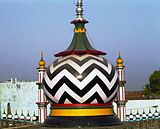- Ahmad Noorani Siddiqi
-
Central figures Ahmed Raza Khan Barelvi
Fazl-e-Haq KhairabadiOrganizations World Islamic Mission
Jamaat Ahle Sunnat
Sunni Tehreek
Jamiat Ulema-e-Pakistan
Dawat-e-Islami
Raza Academy
Sunni Dawat-e-IslamiInstitutions Al Jamiatul Ashrafia · Manzar-e-Islam
Al-Jame-atul-Islamia · Jamiatur RazaLiterature History Indian Rebellion of 1857
Pakistan Movement
2006 Nishtar Park bombing
Asassination of Sarfraz NaeemiNotable individuals Mustafa Raza Khan
Qamaruzzaman Azmi
Hamid Raza Khan
Akhtar Raza
Abdul Aleem Siddiqi
Shah Ahmad Noorani
Syed Shujaat Ali Qadri
Muhammad Muslehuddin SiddiquiBeliefs and practices Sunni Islam · Sufism
Taqlid · Tawassul
Mid-Sha'ban · Mawlid
Khatim an-NabuwwahShah Ahmad Noorani Siddiqi (1926–2003) was a Barelvi Sunni spiritual and political leader in Pakistan. Siddiqi was founder of the World Islamic Mission, leader of the Jamiat Ulema-e-Pakistan (JUP) and later president of the Muttahida Majlis-e-Amal (MMA).[clarification needed]
Contents
Early life and education
Maulana Shah Ahmad Noorani Siddiqui was born in Meerut, India in month of Ramadan and became a hafiz-ul-quran at the age of eight. He graduated from the National Arabic College, Meerut, India and obtained the Fazil-e-Arabi degree from Allahabad University and completed the classical dars-e-Nizami (at advanced or Fazil level) from Darul-Uloom Arabia, Meerut.
Career
After completing his education he started his full-fledged international missionary tours around the world soon after the birth of Pakistan. During his lifetime he held a number of important posts including:
- Honorary Secretary General of the World Muslim Ulama Organisation for twelve years
- Founder of the World Islamic Mission at Dar-ul-Arkam in Makkah al-Mukarramah in 1972
- President of International Islamic Missionaries Guild
- Presided over the International Islamic Conference held at Bradford, U.K., in April 1974 and subsequently elected the First President of the World Islamic Mission.
In his political career Maulana was elected as a Member of Parliament from Karachi in 1970 and subsequently elected leader of the Parliamentary Party of the Jamiat Ulema-e-Pakistan (JUP) unanimously. He retained his Karachi seat for a long timeTemplate:How-long and was a senator.
Honor
Maulana Shah Ahmad Noorani Siddiqui is regarded as a scholar, exemplary leader, statesman, teacher and one of the chief cornerstones of Muslim unity in the second half of the 20th century[citation needed].
He was given the following titles[citation needed]:
- Quaid-e-Ahle Sunna (Leader of Sunni Muslims)
- Quaid-e-Millat e Islaamiyyah (Leader of the entire Ummah)
- Imam Inqilaab (Leader of legal revolution)
- Mujaddid (Reformer of Islam for the current century)
Maulana Shah Ahmad Noorani was an accomplished 'alim who mastered all four schools of fiqh (Islamic Jurisprudence) and followed the madhab of Imam Abu Hanifa both in practice and ijtihad (reasoning). He was a visiting professor who taught al-fiqh al-hanafiyya and 'aqida (belief) of Ahl Sunna wal Jamaah in Baghdad for a number of years. He was Honorary Secretary General of the World Muslim Ulama Organization, with the Grand Mufti of Palestine being its president. He held this office continuously for eleven years and worked for unity of Muslim brotherhood amongst all Muslim nations[citation needed].
The contribution of Ala Maulana Noorani argued, effectively checked the tide of recently concocted ideologies in the form of Wahabism, Deobandism, and Qadianism. Maulana Noorani spent a good portion of his scholarly life promoting Ala as the mujaddid (Muslim Reviver) of the 13th Islamic century. In particular, due to his leadership he was able to influence two generations of Muslim scholars to appreciate the full impact of Ala's thoughts and writings[citation needed].
Death
Maulana Shah Ahmad Noorani Siddiqui passed away 11 December 2003 (16 of Shawwal 1424 Hijri) of a heart attack in Islamabad 15 days after the Eid Festival after the month of Ramadan. It is said[citation needed] that he had visited his mother's grave at clifton, karachi and said that this place will be suitable for me. On the way to hospital Maulana Shah Ahmad Noorani Siddiqui was reciting Part 4 of the Holy Qur'an "Lantana". [1]
Lineage
- Islamic prophet Muhammad(SAW)
- Ali ibn Abu Talib
- Shaikh Hasan al-Basri
- Shaikh Habeeb al-Ajami
- Shaikh Daw'ud al-Ta’ir
- Shaikh Mar'uf al-Karkhi
- Shaikh Sari al-Saqati
- Shaikh Junaid Abu al-Qasim al-Baghdadi
- Shaikh Abu Bakr Shibli
- Shaikh Abdul Wahid
- Shaikh Abdul Aziz al-Tamimi
- Shaikh Abu al-Farah Tartusi
- Shaikh Abul Hasan Farshi al-Qurayshi
- Shaikh Abu Sa'id al-Mubarak Mukharrami
- Shaikh Abdul Qadir Jilani Ghawth al-'Azam
- Shaikh Sayyid Abdur Razzaq
- Shaikh Sayyid 'Abdul Salih al-Faqiri
- Shaikh Sayyid Ahmad Shah
- Shaikh Sayyid Shahabbuddin
- Shaikh Sayyid Shamsud-Din
- Shaikh Sayyid 'Alaa al-Din
- Shaikh Sayyid Nuri Muhammad Shah
- Shaikh Sayyid 'Abd-al-Jalaal al-Sahra
- Shaikh Sayyid Baha wa-al-Shee Qalandar
- Shaikh Abul Ma’ali
- Shaikh Muhkam-al-Din
- Shaikh Shah Amir Ba-Laa Yaaru
- Shaikh 'Abdul-Latif al-Burriy
- Shaikh Darwesh Muhammad
- Shaikh Shah Ahmad Shah
- Shaikh 'Abdul Latif Thani
- Shaikh Madhi Shah
- Shaikh Sayyid 'Azam Ali Shah
- Shaikh Sayyid Muhammad Ghawth Ali Shah
- Shaikh Maulana Muhammad Abdul Hakeem al- Qadiri
- Shaikh Ahmad Mukhtar Siddiqui
- Shaikh Shah Muhammad Abdul Aleem Siddiqui al-Qadiri
- Shaikh Shah Ahmad Noorani Siddiqui al-Qadiri
References
External links
- Imam Noorani Website
- http://www.tangali.net
- http://www.alnoorani.nl
- Salaah ud Deen Ayyubi Publication, Camp Chapelon Mauritius
Categories:- 1926 births
- 2003 deaths
- Muhajir people
- Pakistani politicians
- Islamic studies scholars
- Islam in India
- World Islamic Mission
Wikimedia Foundation. 2010.

